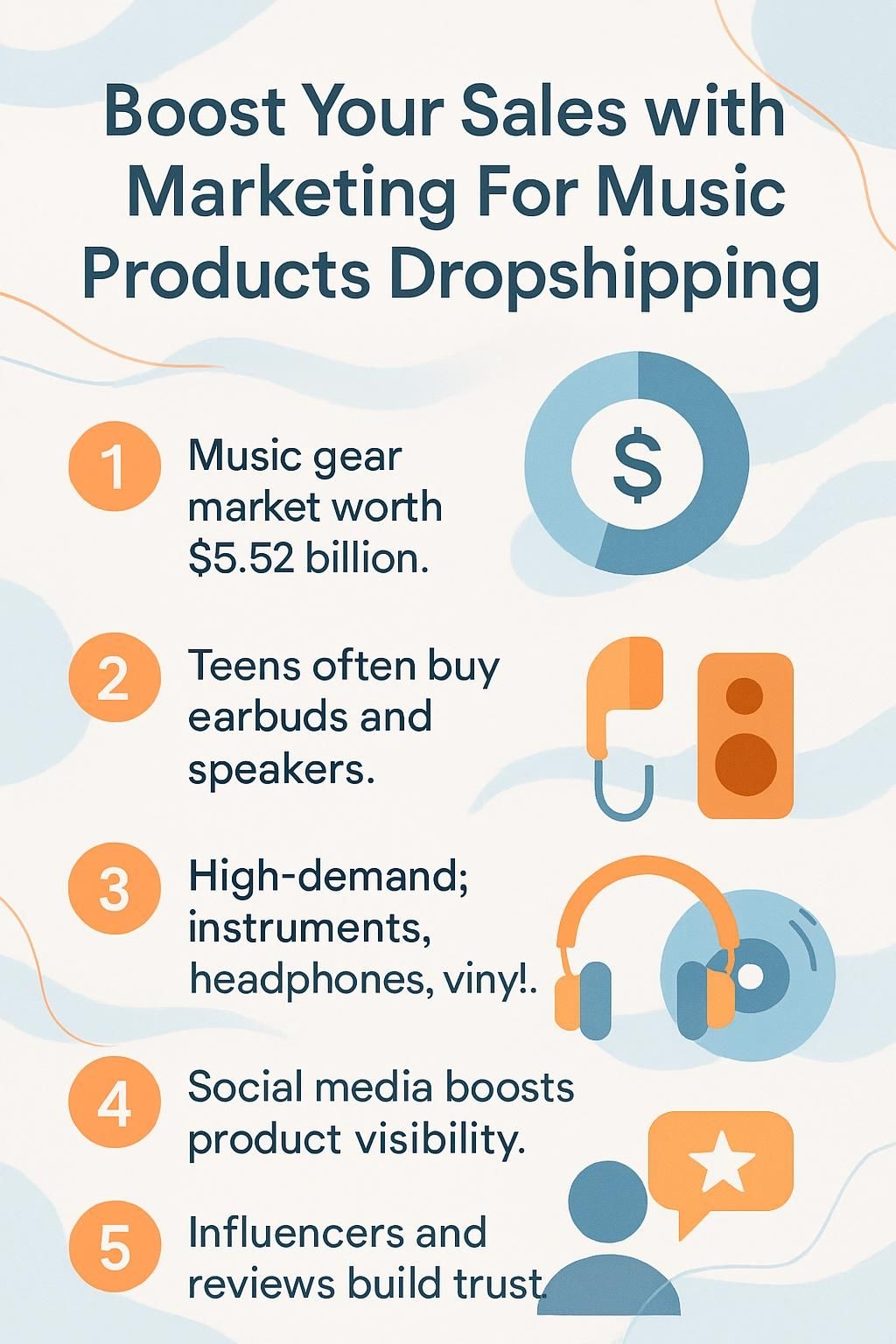Marketing For Music Products Dropshipping means selling music gear online, but you never need to stock up your own storeroom or even touch a product. Stores like yours are popping up everywhere since the industry pulled in $5.52 billion just last year and keeps growing by over 5% each year through 2028 (Statista says so).
People aged 15–24 grab ukuleles and keyboards, adults hunt for home studio gear like microphones and speakers, even schools buy bundles of supplies for music classes.
So here's what's cool—dropshipping lets you snag sales from high-priced items without risky bulk orders sitting around your house. Trend changes? No problem. You can switch products fast because there's no leftover stock holding you back.
Plus, tools like Shopify and WooCommerce make store setup simple, while Inventory Source handles automatic updates so your shop never sells out-of-stock stuff by mistake.

Guitars fly off digital shelves on Dropshipzone; accessories like drumsticks are hot too. If it sounds fun (and pretty profitable), think about this: social media ads on TikTok or Instagram get these instruments in front of eager eyes quick...
Partner with musicians or influencers—they love sharing new finds! Customer reviews help build trust faster than fancy logos ever could.
I started Start Dropshipping almost ten years ago after seeing how much room there was for people ready to try something new—over 150,000 students have jumped in along with me since then.
Now my team works hard keeping our guides fresh across platforms while helping raise cash for education projects at the same time.
Honestly? Making money dropshipping music products is easier now than it has ever been... if you know where to start—and that's exactly what this article covers next!
Find your groove—start by thinking about what makes people excited to buy music stuff online. Some folks want gadgets, merch, or even vinyl record players... others care more about the sound quality in wireless headphones or cool designs on t-shirts for pop and rock fans.

Teens and young adults, mostly ages 15 to 24, shop a lot for music products like earbuds, headphones, and portable Bluetooth speakers. They want cool gadgets that fit their style. Some of my customers buy vinyl record players too—I was surprised by how many high schoolers are into retro stuff!
Adults who use music for fun or brain health also shop often. Folks join choirs or pick up instruments as a hobby after work. On top of that, schools need supplies like microphones or sound reinforcement systems—sometimes they place huge orders all at once! If you include band gear or accessories in your dropship for music store, teachers could become regular buyers.
So yeah...if your dropshipping business targets students, casual listeners, teachers, musicians—even fans buying merch from live performances—you'll reach people who already search for these products online every week.
The demand for music products keeps growing. Many people love music, and they want the best gear.
So there you have it! The music products market has plenty of spots worth exploring for aspiring entrepreneurs!
Building your online presence is key for selling music products. You'll want a website that's easy to use and shows off your products well.
Use bright images, clear descriptions, and simple navigation. Social media can also help you connect with fans and sell more stuff! Share cool posts about music gear or even live videos where you showcase what you're selling.
Creating a user-friendly website is key for your dropshipping store. Great visuals help show off your music products well.
These tips make your site inviting and effective—just what you need to boost those sales!
Social media is a great way to market music products. It helps you reach many people quickly. Here's how you can do it:
Using these tips will help you market effectively in the busy world of e-commerce, especially for must-have items in music culture!
Alright, let's talk about using targeted marketing strategies. You want to sell music products? Start by running ads on Facebook and Instagram. These platforms are popular with music lovers.
You can also team up with musicians or influencers. They have fans who trust them! A shoutout from the right person can skyrocket your sales... So, think about who fits your brand best!
Running ads on Facebook, Instagram, and TikTok can boost your sales for music products. Here are some tips to help you create effective ads.
These steps will help you run effective ads that get attention and drive sales for the music products you dropship!
You can reach more customers by teaming up with influencers and musicians. This can build trust and help you sell your music products better.

Working closely with influencers opens doors in the global music market!
To boost sales, it's super important to give your customers a great experience. You can offer fun product suggestions that match their tastes and look out for them with solid support.
Also, getting customer reviews is key! They help build trust and show others you're legit. Encouraging happy buyers to share their thoughts can really pay off!
Offering personalized recommendations can make a big difference. First, get to know your customers. Use their shopping history and preferences to suggest products for music they might love.
You could send emails with recommended picks based on what they liked before—simple! Also, use chat tools on your site for instant help. People generally appreciate quick answers.
Great support is key too. Make sure you're available when they need you. Offer easy ways to reach out, like email or live chat. Respond quickly; this shows you care about their needs and builds confidence.
Encouraging customer reviews also helps build credibility for your dropshipping store in the music niche; let buyers know others value their feedback!
Customer reviews are key. They build trust and help people decide to buy your music products. When others see positive feedback, they feel more confident in their choice. This can lead to higher sales for you.
Encouraging reviews is simple. After a purchase, ask customers to share their thoughts on platforms like Etsy or social media. You can offer small discounts on future orders as a thank-you for leaving feedback.
Provide excellent customer support too; this makes happy customers likely to talk about their good experiences!
You've learned a lot about boosting sales in music dropshipping. Finding your niche is key. Focus on what customers want, like guitars or recording gear. Build a good website that showcases your products; visuals matter! Using social media will help you engage with fans and promote your store.
Keep in mind to work with reliable suppliers for smooth operations. Good customer service can turn one-time buyers into loyal fans; don't underestimate this! Explore tools that can simplify your business, too.
Take action today and start selling! Your effort can lead to real success in this exciting market. Keep pushing forward—you got this!
Additional Business Insights: Identify your niche by focusing on beginners, professionals, or collectors of vinyl record players. Choose products that suit your niche, such as instruments, audio equipment, or a fashion accessory line that fits your brand. Build a user-friendly website with high-quality images and clear product details. Leverage social media to create engaging content and market products. Run targeted ad campaigns on Facebook, Instagram, and TikTok to reach your audience. This model offers an opportunity for high profits and is a win-win for drop shipping.
Focus on customer experience by offering prompt support and personalized recommendations. Encourage customers to leave reviews and use email or SMS to send exclusive offers. Monitor feedback and adjust strategies to help your online store sell directly and ship it directly. These actionable steps support entrepreneurship and help market products effectively.
Dropshipping for music products lets you sell items like headphones, phonograph records, or fashion accessories without keeping them in stock. You add products to your store from a supplier such as donner music. When someone buys, the supplier ships it directly to the customer.
Affiliate marketing helps by letting others promote your ecommerce shop with their own pitch or youtube videos. Affiliates earn money when people buy through their links. This brings more visitors and online sales without extra cost.
Dropshipping presents a practical choice because you do not need to purchase any merchandise up front or handle fulfillment yourself. It allows quick order tracking, serves urgent orders, and offers a chance for high profits by selling higher ticket music gear.
Customers want active noise control, long battery life, high fidelity sound quality like stereophonic sound or home cinema options; they also care about sizes and styles that fit their needs plus easy order tracking.
Use digital marketing strategies such as social media news updates and creating helpful youtube videos about your items' features like noise cancellation or electric battery details; this will attract vip dropshipping customers who want insightful info before buying.
Yes; many platforms let you connect with suppliers quickly so you can start selling new goods fast—this makes it easier to meet demand while offering different price points on both practical accessories and higher-end electronics for home use.
Disclosure: This content is informational and should not be taken as professional financial or business advice. It contains affiliate links that may generate commission if you purchase through them.
No posts found